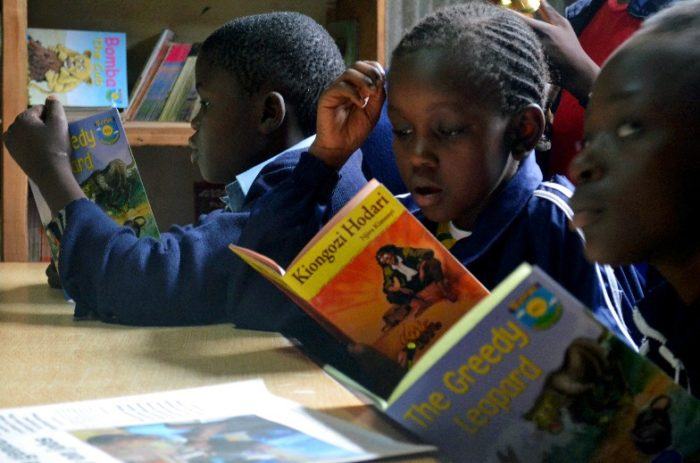This is the second in our series about our civil society programs and community philanthropy, which means working with communities to develop local solutions to local problems. This story comes from the Yetu Initiative, a Global Development Alliance with the U.S. Agency for International Development (USAID) in Kenya; Yetu means “ours” in Kiswahili. This post looks at how Yetu strengthens assets, one of three pillars of community philanthropy: assets, capacity, and trust. See the first in the series here.
Using Local Assets to Increase Literacy
In Mathare, a poor neighborhood at Nairobi’s edge, few families have books. Even the local schools lack reading material. Across Kenya, only two percent of public schools have libraries. Until recently students at Mathare’s Joy Primary School had few chances to read on their own. Instead of a library, the school had just a box with some textbooks. When Viola Anyango, now a Grade 8 student and volunteer librarian, first arrived she was far behind in reading. “When I first came to the school, I was not good at reading,” she admits.

Schools like the Joy School are taking advantage of local assets to increase literacy
That changed when Joy School gained a library courtesy of RAAW Trust, a Kenyan nonprofit group, with funds raised by its Start-A-Library campaign. Once the library brought 1,000 storybooks in November 2015, Viola started devouring them.
“I come at least once a week,” Viola says, and at home she finds time to read every night. “The library has helped me improve my reading, language and writing composition.”
The Start-A-Library campaign made headlines last year as a shining example of online philanthropy where Kenyans donated to local organizations addressing Kenyan priorities. RAAW Trust, the nonprofit arm of Storymoja, a Kenyan publisher, received support for its campaign with strategy and training from the Yetu Initiative, a partnership between USAID and the Aga Khan Foundation that aims to grow the environment for local philanthropy and civil society organizations. Start-A-Library, the first Yetu-supported campaign, raised over US$248,332 in Kenya.
Showing Results
Now after the headlines, the Joy School library has shown results with the local assets the campaign brought. Students began performing better, and teachers noted improvements in the learning atmosphere. According to Job Wesonga, RAAW Trust representative, the library also boosted students’ confidence to practice English conversation. This growing confidence in English prompted teachers to start a debate club where the students could practice even more. Soon Joy School students were competing with other clubs across Nairobi and winning.
The library, says Viola, “has also helped me to have the confidence to speak frequently in front of many people.”
A year after it was established, the Joy School library received special a commendation at the 2016 National Library of the Year Award (Maktaba Award) ceremony, held at the National Museums of Kenya. The Joy School was recognized for its library activities and reading promotion programs. The judges cited the enthusiasm expressed by both children and teachers.
Project Outcomes
These results are a dream come true for RAAW Trust’s co-founder, Muthoni Garland, a Kenyan author who hopes to put a book in every Kenyan child’s hand. The Yetu-supported campaign raised funds to install 55 school libraries, and a follow-up campaign installed 61 more libraries in two more counties, for a total of over 110 libraries in at least four counties, surpassing the target of 100. “One of the most wonderful surprises has been the way the campaign opened doors to local governments,” says Garland. “County governments responded warmly, pledging more than any other category. The campaign galvanized them.”
This example shows how a local organization can raise private assets that in turn leverage public support and government funds that address a priority. Viola attests to what it means for Kenya’s future.